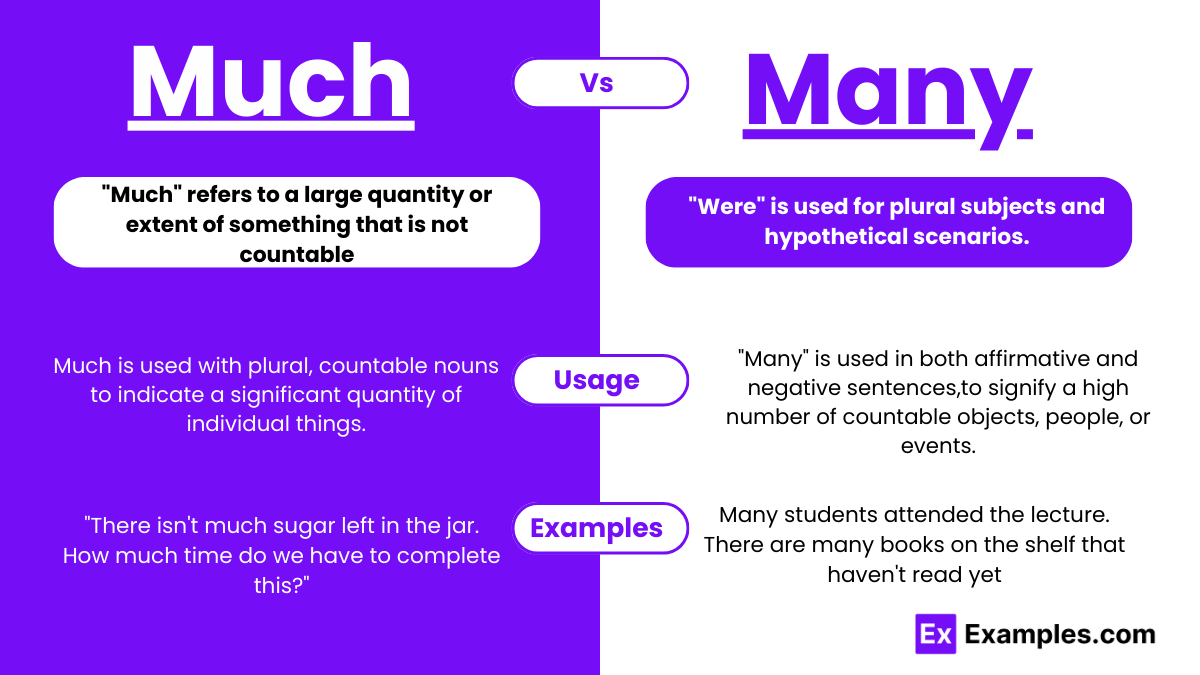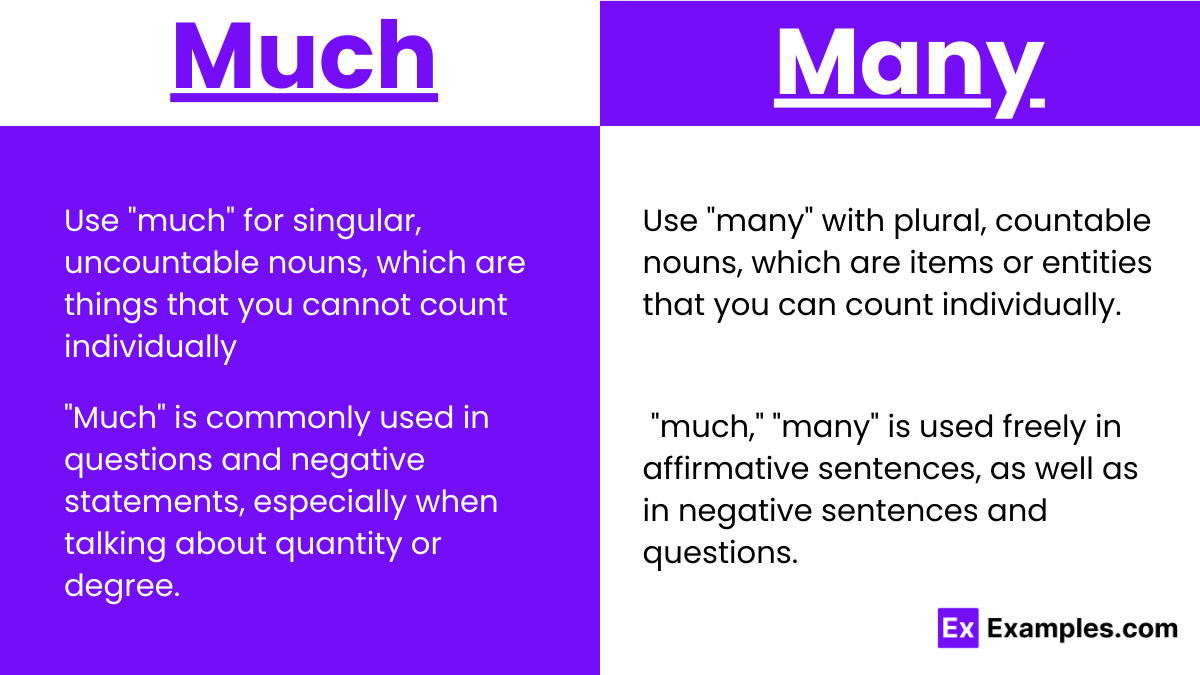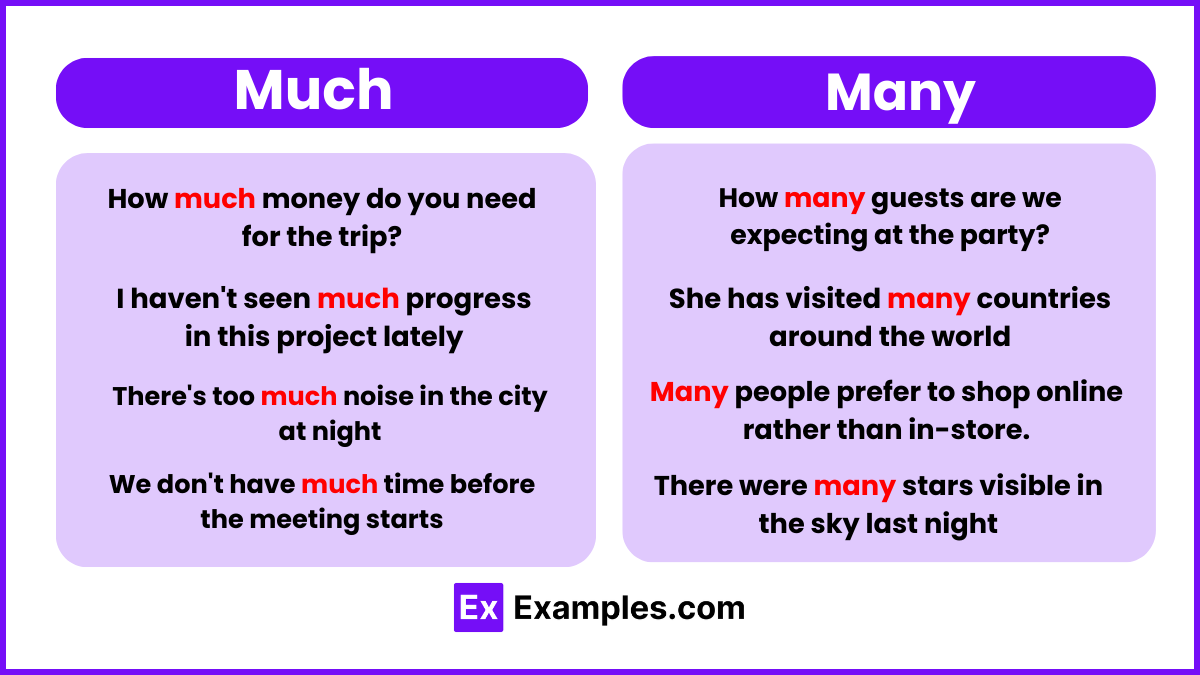Much vs Many – Examples, Difference, Tricks, How to use
In English, “Much” and “Many” are quantifiers used to indicate a large amount of something, but they are used differently based on the type of noun they’re quantifying. “Much” is used with uncountable nouns, which are items that we cannot count individually, such as “water,” “sand,” or “information.” For example, you might say, “I don’t have much time.” On the other hand, “many” is used with countable nouns, which refer to items that can be counted, like “books,” “cars,” or “people.” An example would be, “There are many stars in the sky.” Understanding the distinction between “much” and “many” is essential for expressing quantities accurately in English.
Much and Many – Meaning
- Much: Much refers to a large quantity or degree of something that is not countable. It is used with singular, uncountable nouns to describe a large amount of a substance, concept, or abstract quality. Much is often used in questions, negative statements, or with “too,” “so,” “as,” and “very” to express the idea of a large amount of something that cannot be counted. For example, one might say, “There is much interest in the upcoming election,” or, “I don’t have much time to finish this project.”
- Many: Many refers to a large number of items, people, or entities that can be counted. It is used with plural, countable nouns to denote a significant quantity of individual items or units. Many is commonly used in both affirmative and negative sentences, as well as questions, to indicate a high number of countable things. For example, one could say, “Many people attended the concert,” or, “There aren’t many cookies left in the jar.”
Summary
The primary distinction between “much” and “many” lies in their application to different types of nouns. “Much” is used to quantify uncountable nouns, referring to a large quantity of something that cannot be individually counted, such as water, happiness, or sand. On the other hand, “many” is used with countable nouns, indicating a large number of individual items or entities that can be counted, like books, cars, or people. Understanding the difference is crucial for accurate expression in English, as it helps convey the extent of quantity or volume with precision, whether it’s something tangible and countable or abstract and uncountable.
How To Pronounce Much and Many
Pronouncing English words correctly can significantly impact your clarity and understanding in communication. Here are simple guidelines to help you pronounce “Much” and “Many” correctly.
Much
- Phonetic Spelling: /mʌtʃ/
- Pronunciation Tips: The word “much” begins with the /m/ sound, where your lips come together. Following that is the /ʌ/ sound, similar to the ‘u’ in “cut” or “hut.” Finally, it ends with a /tʃ/ sound, which is the same sound you hear at the end of “watch” or “catch.” The tongue lightly touches the roof of the mouth behind the teeth, and then a short, sharp sound is produced.
Many
- Phonetic Spelling: /ˈmɛni/
- Pronunciation Tips: “Many” starts with the /ˈm/ sound, just like “much.” The difference comes with the vowel sound /ɛ/, which is like the ‘e’ in “bed” or “pet.” It ends with the /ni/ part, where the ‘n’ is pronounced as usual in English, and the ‘i’ is similar to the ‘ee’ in “see” or “bee.” The sound is somewhat longer and ends with a clear, distinct ‘ee’ sound.
Difference Between Much and Many
| Aspect | Much | Many |
|---|---|---|
| Usage | Used with uncountable nouns. | Used with countable nouns. |
| Noun Type | Singular, uncountable nouns (e.g., sand, water, information). | Plural, countable nouns (e.g., books, cars, people). |
| Context | Often used in questions, negative statements, or with words like “too,” “so,” “as,” and “very.” | Used in both affirmative and negative statements, as well as questions. |
| Meaning | Refers to a large quantity or degree of something that cannot be individually counted. | Indicates a large number of items or entities that can be individually counted. |
| Examples | Much time, much effort, much sugar. | Many friends, many cars, many books. |
Tricks to Remember “Much” and “Many”
Understanding when to use “much” and “many” can enhance your English language skills significantly. Here are some easy tricks to remember the difference:
For “Much”:
- Memorize the Use with Non-Countable Concepts: Think of “MUCH” as standing for “Measurable Units for Concepts and H2O (water).” This mnemonic helps you recall that “much” is used for things that cannot be counted individually, such as abstract concepts (love, happiness) or substances (water, sand).
- Visualize Liquid: Since “much” is often used with substances that can be poured or are fluid in nature (like water, coffee, air), picturing a liquid can help remind you that “much” is the word to use with uncountable nouns.
For “Many”:
- Count on “Many”: Simply remember that “many” has the same number of letters as “count,” and it’s used for things you can count. This can help you associate “many” with countable nouns.
- Visualize a Crowd: Think of “many” as a way to describe groups of countable items or people. Picturing a crowd or a bunch of objects can trigger your memory to use “many” when referring to countable nouns.
By employing these tricks and visual cues, you can quickly recall whether to use “much” or “many” in a sentence, improving both your written and spoken English accuracy.
When to Use Much and Many
Understanding when to use “much” and “many” is essential for expressing quantity accurately in English. Here’s a guide to help distinguish between these two quantifiers:
Use “Much” When:
- Referring to Uncountable Nouns: Use “much” for singular, uncountable nouns, which are things that you cannot count individually. These include abstract concepts (like love, information, or happiness) and substances or materials (such as water, sand, or air).Example: There isn’t much sugar left in the jar.
- In Questions and Negative Sentences: “Much” is commonly used in questions and negative statements, especially when talking about quantity or degree.Example: How much time do we have to complete this?
Use “Many” When:
- Referring to Countable Nouns: Use “many” with plural, countable nouns, which are items or entities that you can count individually. These include objects, people, and animals.Example: There are many books on the shelf.
- In Affirmative, Negative Sentences, and Questions: Unlike “much,” “many” is used freely in affirmative sentences, as well as in negative sentences and questions.Example: There are many ways to solve this problem.
How to Use “Much” and “Many”
“much” and “many” are quantifiers used to express the amount or quantity of something. Their correct use depends on the type of noun they’re describing—whether the noun is countable or uncountable. Here are guidelines to help you use these words accurately in sentences.
Using “Much”:
- With Uncountable Nouns: Use “much” for singular, uncountable nouns, which typically refer to things that you cannot count individually. This includes substances (like water, air, sugar), concepts (such as time, advice, information), and abstract ideas (like happiness, freedom).
- In Questions and Negative Statements: “Much” is often used in questions and negative sentences, although it can appear in affirmative sentences when combined with too, so, very, and as.
Using “Many”:
- With Countable Nouns: Use “many” for plural, countable nouns, which are items or entities you can count individually. This category includes things like books, people, cars, and houses.
- In Affirmative, Questions, and Negative Sentences: Unlike “much,” “many” can be used freely in affirmative sentences, in addition to questions and negatives.
Examples of Much and Many
Examples of “Much”
- How much money do you need for the trip?
- I haven’t seen much progress in this project lately.
- There’s too much noise in the city at night.
- We don’t have much time before the meeting starts.
- After the storm, there was much damage to repair.
Examples of “Many”
- How many guests are we expecting at the party?
- She has visited many countries around the world.
- Many people prefer to shop online rather than in-store.
- We faced many challenges during the project’s development.
- There were many stars visible in the sky last night.
Synonyms For Much and Many
| Word | Synonyms for “Much” | Synonyms for “Many” |
|---|---|---|
| 1 | A great deal | Numerous |
| 2 | A lot | Several |
| 3 | Plenty | A multitude of |
| 4 | A large amount | Countless |
| 5 | Considerable | Various |
| 6 | Substantial | A large number of |
| 7 | Vast | Scores of |
| 8 | Immense | Multiple |
| 9 | Extensive | A plethora of |
| 10 | Copious | An abundance of |
Exercise
Fill in the blank with the correct form of Much and Many
- How ____________ sugar do you need for the cake?
- There are ____________ reasons why I love reading.
- We haven’t seen ____________ snow this winter.
- ____________ people believe that starting the day early is beneficial.
- I don’t have ____________ time to finish this project today.
- There were ____________ stars visible in the sky last night.
- How ____________ water does this plant require?
- ____________ students in the class passed the exam with good grades.
- She has ____________ patience when it comes to teaching new skills.
- There aren’t ____________ cookies left in the jar.
Answers
- much
- many
- much
- Many
- much
- many
- much
- Many
- much
- many
FAQs
How Do You Teach Many and Much?
To teach “many” and “much,” focus on countability. “Many” is for countable nouns (books, cars), and “much” is for uncountable nouns (water, information). Use visual aids and examples to differentiate between countable and uncountable nouns, reinforcing with exercises.
Is Homework Much or Many?
Homework is uncountable; therefore, the correct form is “much.” You would say, “I have too much homework this weekend,” because homework cannot be counted individually.
What Is the Rule of Much and Many?
The rule for “much” and “many” centers on noun countability. Use “much” with uncountable nouns to denote a large quantity and “many” with countable nouns to indicate a large number. Remember, “much” often appears in questions and negative statements, while “many” is used more broadly.




